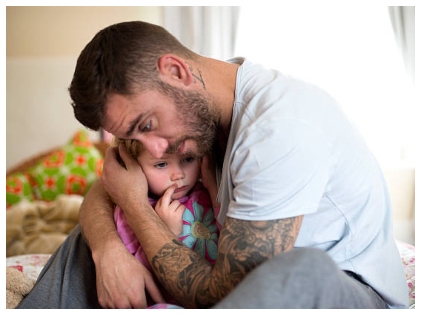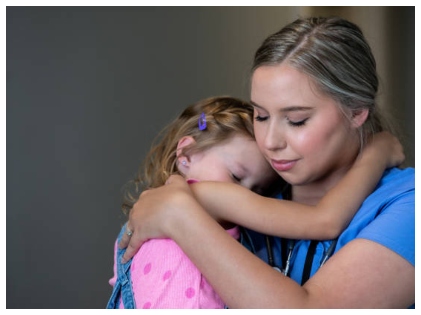
How To Handle Separation Anxiety of Your Child? A Few Valuable Tips to Aid You in The Journey!

 Separation anxiety happens to most children, while the intensity of it varies in each one of them. Some babies even become hysterical as soon as their mom is out of sight. It may affect children of different ages – infancy, toddlerhood, and preschool.
Separation anxiety happens to most children, while the intensity of it varies in each one of them. Some babies even become hysterical as soon as their mom is out of sight. It may affect children of different ages – infancy, toddlerhood, and preschool.
So, how can you handle an acute sense of separation anxiety? There are different ways to prepare yourself for it, including preparation, brisk transitions, and more over time. The truth is that parents may suffer from a similar case of separation anxiety when they start working. The quick pang of guilt you feel when your kids hold on to them when you leave for work. You may even have a feeling that you are doing it all wrong. While the transition may turn out to be difficult, you can handle the kids if you are well-prepared, and here’s how to do it.
Good-Bye Rituals That Work
 While you may not want your child to bank upon coping hacks, there are some things that you can leave behind to lower the separation anxiety, such as major-league-baseball-style hand movements or cubby. You can also leave behind a special blanket or a toy to take their minds off the current situation. It is important to show your love and resolve at the same time. If you linger too much, then you may unnecessarily cause more problems.
While you may not want your child to bank upon coping hacks, there are some things that you can leave behind to lower the separation anxiety, such as major-league-baseball-style hand movements or cubby. You can also leave behind a special blanket or a toy to take their minds off the current situation. It is important to show your love and resolve at the same time. If you linger too much, then you may unnecessarily cause more problems.
Just stick to the comfort of a routine which can build the feeling of trust. Stay consistent, stick to a routine and do the same ritual at the same time each day, this can avoid unexpected problems or displays of distress. A routine can also minimize heartache and other issues.
Give Ample Attention
When you separate from your child, just ensure you give your him full attention, shower affection but not too much. Followed by the love, say a firm good-bye before the antics begin. Also, try and focus on the fact that you will come back at the right time and then you can do something together. This will give your child to look forward to something. It can be as fun as playing their favorite game or as simple as reading a book together.
Ensure You Keep Your Promise
Your child will start trusting you only when you stick to your promise of return. It is particularly important to keep up the promise during the transitionary phase. If you are just a little bit late, your son or daughter may start blaming you for not keeping up with your word. Just a few days of not following the rule may make your child insecure. So, it is important to take a good look at your routine, leave early, if your job is demanding, so that you can come early. It may seem difficult at the onset, but a few days down the line, you’ll find that it is not as difficult as it initially seemed.
Be Specific When You Promise Your Child
 When you leave, your child may be looking for a specific assurance. So, give them a time – you can tell them you’ll be back by nap time or you may have the afternoon snack together. Ensure that they understand the time. This may even be a good time to teach them the mechanics of a clock. Just tell them you’ll be back when the smaller hand of the clock reaches three and the bigger hand reaches five. You can prepare them for uncertainties as well. Tell them you’ll call them if you are late. Try and think of a funny ritual in that case, this may stop them from getting into a fit or crying.
When you leave, your child may be looking for a specific assurance. So, give them a time – you can tell them you’ll be back by nap time or you may have the afternoon snack together. Ensure that they understand the time. This may even be a good time to teach them the mechanics of a clock. Just tell them you’ll be back when the smaller hand of the clock reaches three and the bigger hand reaches five. You can prepare them for uncertainties as well. Tell them you’ll call them if you are late. Try and think of a funny ritual in that case, this may stop them from getting into a fit or crying.
Practice Separation
Your child needs to stay separate from time to time. Arrange for play dates or send them to their grandma’s home. Allow friends and family to take care of your child on the weekend. Getting them to do this before they join the school is very important, as then leaving them at school won’t cause much of a problem. Ensure your child gets a chance to prepare, experience, survive, and even thrive in your absence.
If you are still concerned about your child’s adapting capabilities, talk to a pediatrician who will help deal with your unease and forge a suitable plan for you.
More in Family Counseling
-
`
5 Reasons Why Dad’s Side of the Family Misses Out
Family bonds are intricate and multifaceted, often creating a unique tapestry of connections. However, many people notice a peculiar trend: stronger...
July 12, 2024 -
`
A Quick Guide on How to Get Short-Term Disability Approved for Anxiety and Depression
Living with anxiety or depression poses unique challenges, particularly in the workplace, where stress can exacerbate symptoms. For many, short-term disability...
July 5, 2024 -
`
Why Do People Feel Sleepy After Eating?
Is feeling sleepy after eating a sign of diabetes? Well, not directly. There are many reasons why you feel drowsy after...
June 20, 2024 -
`
What Is High-Functioning Depression? Symptoms and Treatment
High-functioning depression may not be a term you hear every day, but it’s a very real and challenging experience for many....
June 13, 2024 -
`
Kelly Clarkson’s Weight Loss Ozempic Journey – Debunking the Rumors
In a refreshing moment of transparency, Kelly Clarkson, the beloved singer and talk show host, sheds light on her remarkable weight...
June 3, 2024 -
`
What Is the Best Milk for Gut Health and Why?
In recent years, the milk section at the grocery store has expanded far beyond the traditional options. While cow’s milk has...
May 30, 2024 -
`
Do Dental Implants Hurt? Here’s All You Need to Know
When you hear “dental implants,” you might wince at the thought of pain. But do dental implants hurt as much as...
May 24, 2024 -
`
5 Key Differences Between A Psych Ward & A Mental Hospital
Curious about the differences between a psych ward and a mental hospital? You are not alone. With the mental health conversation...
May 16, 2024 -
`
It’s Official! “Selling Sunset’s” Christine Quinn & Husband Christian Dumontet Are Parting Ways
Have you ever found yourself unexpectedly engrossed in the personal lives of celebrities, especially when their stories take dramatic turns? Well,...
May 9, 2024










You must be logged in to post a comment Login